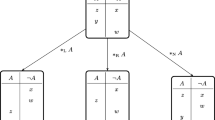Abstract
In this paper we investigate three approaches to iterated contraction, namely: the Moderate (or Priority) contraction, the Natural (or Conservative) contraction, and the Lexicographic contraction. We characterise these three contraction functions using certain, arguably plausible, properties of an iterated contraction function. While we provide the characterisation of the first two contraction operations using rationality postulates of the standard variety for iterated contraction, we found doing the same for the Lexicographic contraction more challenging. We provide its characterisation using a variation of Epistemic ranking function instead.
Similar content being viewed by others
References
Alchourrón, C. E., Gärdenfors, P., & Makinson, D. (1985). On the logic of theory change: Partial meet contraction and revision functions. Journal of Symbolic Logic, 50, 510–530.
Boutilier, C. (1993). Revision sequences and nested conditionals. In International joint conferences on artificial intelligence (pp. 519–525).
Chopra, S., Ghose, A., Meyer, T., & Wong, K.-S. (2008). Iterated belief change and the recovery axiom. Journal of Philosophical Logic, 37, 501–520.
Darwiche, A., & Pearl, J. (1997). On the logic of iterated belief revision. Artifical Intelligence, 89, 1–29.
Dubois, D., & Prade, H. (1988). Representation and combination of uncertainty with belief functions and possibility measures. Computational Intelligence, 4, 244–264.
Dubois, D., & Prade, H. (1991). Epistemic entrenchment and possibilistic logic. Artifical Intelligence, 50(2), 223–239.
Dubois, D., & Prade, H. (2004). Possibilistic logic: A retrospective and prospective view. Fuzzy Sets and Systems, 144(1), 3–23.
Gärdenfors, P. (1988). Knowledge in flux: Modeling the dynamics of epistemic states. Cambridge: Bradford Books, MIT Press.
Grove, A. (1988). Two modellings for theory change. Journal of Philosophical Logic, 17, 157–170.
Harper, W. L. (1976). Rational conceptual change. PSA: Proceedings of the Biennial Meeting of the Philosophy of Science Association, 1976, 462–494.
Hild, M., & Spohn, W. (2008). The measurement of ranks and the laws of iterated contraction. Artificial Intelligence, 172(10), 1195–1218.
Kyburg, H. E., Jr. (2003). Are there degrees of belief? Journal of Applied Logic, 1(3–4), 139–149.
Levi, I. (1984). Decisions and revisions. Cambridge University Press.
Levi, I. (1996). For the sake of the argument. Cambridge University Press.
Nayak, A. C. (1993). Studies in belief change. Doctoral Dissertation, Department of Philosophy, University of Rochester.
Nayak, A. C., Goebel, R., & Orgun, M. A. (2007). Iterated belief contraction from first principles. In International joint conferences on artificial intelligence (pp. 2568–2573).
Nayak, A. C., Goebel, R., Orgun, M. A., & Pham, T. (2005). Iterated belief change and the levi identity’. In J. P. Delgrande, J. Lang, H. Rott, & J.-M. Tallon (Eds.), Belief change in rational agents. Dagstuhl Seminar Proceedings (Vol. 05321). Germany: Internationales Begegnungs- und Forschungszentrum für Informatik (IBFI), Schloss Dagstuhl.
Nayak, A. C., Goebel, R., Orgun, M. A., & Pham, T. (2006). Taking Levi identity seriously: A plea for iterated belief contraction. In Proc. of the 1st int. conf. on Knowledge Science, Engineering and Management (KSEM 06) (pp. 305–317). LNAI: Springer.
Rott, H. (2001). Change, choice and inference: A study of belief revision and nonmonotonic reasoning. Oxford Science Publications, Clarendon Press.
Rott, H. (2006). Shifting priorities: Simple representations for twenty-seven iterated theory change operators. In H. Lagerlund, S. Lindstrom, & R. Sliwinski (Eds.), Modality matters: Twenty-five essays in honour of Krister Segerberg (pp. 359–384). Uppsala University Press.
Rott, H. (2009). Degrees all the way down: Beliefs, non-beliefs and disbeliefs. In F. Huber, & C. Schmidt-Petri (Eds.), Degrees of belief (pp. 301–339).
Shackle, G. L. S. (1952). Expectation in economics (2nd ed.). Cambridge University Press.
Spohn, W. (1988). Ordinal conditional functions. A dynamic theory of epistemic states. In: W. L. Harper, & B. Skirms (Eds.), Causation in decisions, belief change and statistics (Vol. II, pp. 105–134). Kluwer.
Author information
Authors and Affiliations
Corresponding author
Rights and permissions
About this article
Cite this article
Ramachandran, R., Nayak, A.C. & Orgun, M.A. Three Approaches to Iterated Belief Contraction. J Philos Logic 41, 115–142 (2012). https://doi.org/10.1007/s10992-011-9201-7
Received:
Accepted:
Published:
Issue Date:
DOI: https://doi.org/10.1007/s10992-011-9201-7




